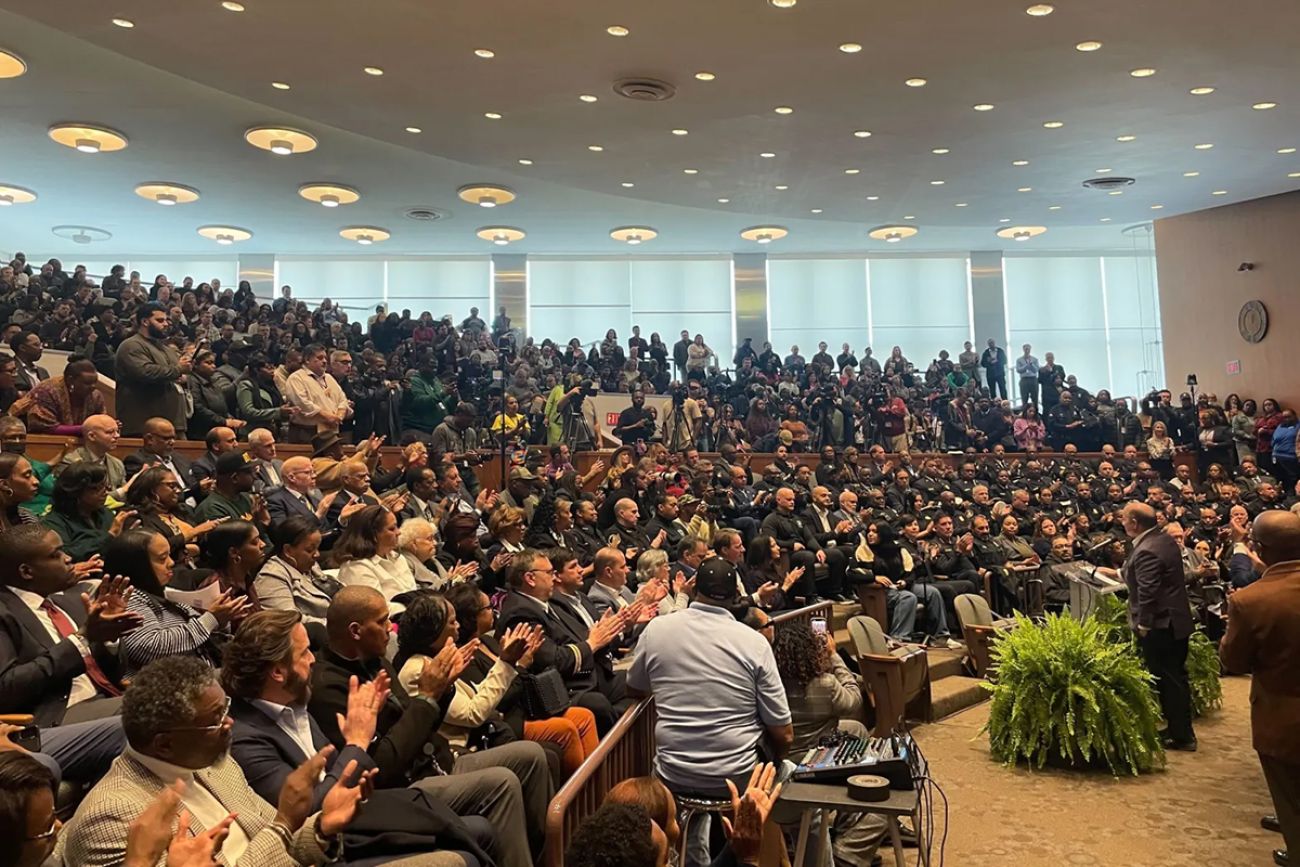Detroit Mayor Mike Duggan won't seek reelection in Michigan's biggest city

Detroit Mayor Mike Duggan will not seek reelection to a fourth term, setting up a major political shift in Michigan’s largest city.
Duggan, first elected in 2013 as Detroit’s 75th mayor, thanked city leaders and employees for their efforts and support at the Erma Henderson auditorium on Wednesday. He outlined a vision for his final year in office, committing to staying focused on sustaining the city’s progress, expanding neighborhood opportunities and attracting young talent.
“Detroit’s story of resurgence is one of Detroiters who never gave up on their city,” Duggan said in a statement provided to BridgeDetroit before Wednesday’s event. “It has been the honor of a lifetime to serve as mayor over the past 12 years and I am incredibly proud of what we’ve accomplished together—from emerging out of bankruptcy to becoming a vibrant, healthy city that is a model of resilience and transformation. This last year is about continuing the work we started and ensuring Detroit’s success remains rooted in opportunity for everyone.”
The mayor’s decision to leave office after his term expires in 2025 clears the field for an open race to succeed him. Several figures have already expressed interest in running, including Council President Mary Sheffield, Council Member Fred Durhal III, nonprofit CEO Saunteel Jenkins and businessman Joel Haashiim. Other potential candidates include Rev. Solomon Kinloch, Jr. and former Police Chief James Craig.
Related:
- What Donald Trump’s ‘mass deportations’ may mean for Michigan immigrants
- Mike Duggan for Michigan governor? New nonprofit takes Detroit story statewide
- Duggan urges state Legislature to fix Detroit’s ‘unfair’ tax system
Democratic officials expect Duggan, 66, will launch a campaign for Michigan governor later this year. Gov. Gretchen Whitmer cannot run again due to term limits. Voters won’t decide on her replacement until 2026.
Detroit’s mayor is a nonpartisan position, though Duggan has been a lifelong Democrat. He became the city’s first white mayor since 1974 by unconventional means but voters overwhelmingly supported his leadership in subsequent elections.
He was removed from the ballot in 2013 after a court ruled he had not been registered as a Detroit resident long enough. Duggan opted to run as a write-in candidate in the primary, led the field with 52% of the vote and went on to beat Benny Napoleon in a head-to-head general election with 55% of the vote.
Duggan was reelected in 2017, beating current City Council Member Coleman Young II with 72% of the vote. He secured a third term in 2021 by beating Anthony Adams with 75% of the vote.
Duggan is a former Wayne County prosecutor, deputy county executive, former CEO of Detroit Medical Center and former Livonia resident.
As mayor, Duggan has been metrics-oriented. His administration holds regular celebrations to recognize hitting milestones for new streetlights, fire hydrants and affordable housing units, demolished buildings, cleared-out alleys and other targets. The so-called political “pit bull” is described as demanding by employees.
Former Chief Operating Officer Brad Dick said Duggan once called him in the evening to ask why trash wasn’t being picked up. Dick said Duggan had been driving neighborhoods at night to inspect how well a service change was working.
“Some leaders don’t get out in the field that much but he’s in the operation,” Dick said. “You don’t like letting Mike Duggan down.”
Duggan took office five months after Detroit’s bankruptcy was filed, while a state-appointed emergency manager was overseeing the city’s restructuring. Duggan touted the city’s transformation from bankruptcy to financial stability, boasting $500 million in reserves today and an investment-grade credit rating.
Detroit went from having the worst priority one EMS response times in the country to the best in the nation. The number of violent crimes has reached a historic low in 2023 and continued to drop this year, though shootings and homicides remain high when adjusted for population.
Early supporters like Rev. Jim Holley, former Police Chief Ike McKinnon and activist Malik Shabazz pitched Duggan as a crisis manager. A decade after taking office, Duggan argues he’s made significant progress to stabilize the city and take neighborhoods “from blight to beauty.”
The mayor oversaw a significant campaign to demolish vacant buildings. A decade ago, Detroit was given a dire recommendation by an Obama administration task force to “eradicate the blight.” Led by billionaire Dan Gilbert, a 2014 task force found 30% of buildings in neighborhoods across the city were dilapidated or heading that way.
The complete elimination of dangerous structures was pitched as an essential step toward the city’s resurgence. At least 40,000 crumbling buildings would need to come down. What followed was heralded as the largest demolition program in the country.
When Duggan took office, the city was burdened with 47,000 vacant, abandoned homes. Today, 3,000 remain.
“My goal was to ensure Detroit’s next mayor has a strong foundation that enables the city to thrive for generations to come,” Duggan said in a statement. “We came into a city in bankruptcy and are leaving behind a city with an investment-grade credit rating and $500 million in financial reserves. I am confident the next Mayor and City Council will take Detroit to even greater heights.”
Duggan’s mayoral campaign committee reported little activity this year, another early sign that Duggan wouldn’t run for reelection.
Duggan collected only four donations throughout the year. Two donors contributed most of the funding, including $6,600 from Rush Trucking CEO Andra Rush in January and a $1,000 gift from the Michigan Distributors and Vendors Association PAC in October.
Duggan’s fundraising committee has $25,383 remaining, according to an October filing. Duggan meanwhile spent $21,000 in campaign funds this year on consultants, campaign software, legal fees and other expenses.
See what new members are saying about why they donated to Bridge Michigan:
- “In order for this information to be accurate and unbiased it must be underwritten by its readers, not by special interests.” - Larry S.
- “Not many other media sources report on the topics Bridge does.” - Susan B.
- “Your journalism is outstanding and rare these days.” - Mark S.
If you want to ensure the future of nonpartisan, nonprofit Michigan journalism, please become a member today. You, too, will be asked why you donated and maybe we'll feature your quote next time!




